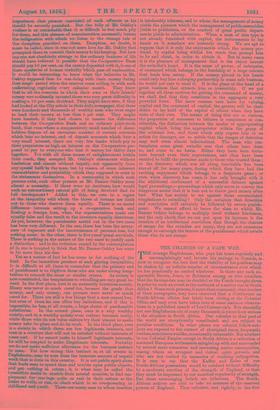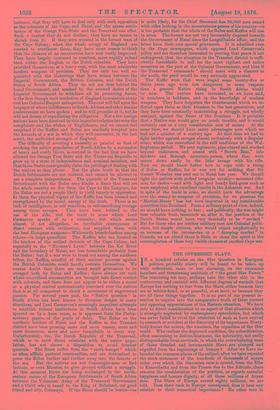'.1.'11±, CHANCES OF A CAPE WAR: T HE average Englishman, who
pays his taxes, regularl3r and uncomplainingly and invests his savings in Consols, is , slow to recognise the fact that the stability of his positionmay be shaken by an infinite number of circumstances over which he has practically no control whatever. Is there any such re- spectable Brown, Jones, or Robinson among us who considers that the Income-tax may be doubled or the Funds brought down in price by such an event as the outbreak of a native war in South Africa ? Some such persons, if more than commonly close readers of their newspapers, may have observed that a Conference on South-African affairs has lately been sitting at the Colonial Office, and may even have taken note of some ominous observa- tions in a published speech of Lord Carnarvon's. But assuredly not one Englishman out of many thousands is aware how serious is the situation in South Africa. Our colonies in that part of the world are exceptionally constituted, and are subject to peculiar conditions. In other places our colonial fellow-sub- jects are exposed to the contact of aboriginal races, frequently restless, sometimes warlike, occasionally untamable. But nowhere in our Colonial Empire except in South Africa is a collection of scattered European settlements mingled up with and surrounded by several more numerous and increasing native communities, among whom an arrogant and violent spirit prevails, and who are not curbed by memories of crushing subjugation. It is easy to say that the Kaffirs and Zulus of our South-African possessions would be subdued without difficulty by a moderate exertion of the strength of England, or that theymust be impressed by our manifest superiority of strength. But these encouraging beliefs are fallacious. The South- African natives are able to take no measure of the reserved powers of England. They calculate, and rightly, in the. first
instance, that they will have to deal only with such opposition as the colonists of the Cape, and Natal, and the sparse settle- ments of the Orange Free State and the Transvaal can offer. Such a contest they do not decline ; they have no reason to shrink from it. If they were worsted in the former wars of the Cape Colony, when the whole energy of England was exerted to overthrow them, they have some reason to think that the chances of an insurrection have now vastly improved. They have largely increased in numbers, more rapidly indeed than either the English or the Dutch colonists. They have provided themselves, at a heavy cost, with the most admirable modern weapons of precision. They are only too well ac- quainted with the bickerings that have arisen between the Imperial Government, the British Colonies, and the Dutch States of South Africa. They do not see that behind the Local Government, and masked by the avowed desire of the Imperial Government to withdraw all its protecting forces, is the firm though tacit resolution of England to maintain at any cost her Colonial Empire unimpaired. The cost will fall upon the taxpayer of whose indifference to South-African and other similar controversies we have spoken ; and he will grumble at it, but he will not dream of repudiating the obligation. Not a few foreign nations have been deceived by this imperfect relation between the complaints and the wishes of Englishmen, and we cannot feel surprised if the Kaffirs and Zulus are similarly tempted into the hazards of a war in which they will encounter, in the last resort, the undivided strength of England.
The difficulty of averting a necessity so painful as that of crushing the native population of South Africa by a succession of heavy and costly blows, is. centred in the fact that we have allowed the Orange Free State and the Transvaal Republic to grow up in a state of independence and nominal isolation, and that those States consequently claim the privilege of dealing with the natives as they please. But the plain truth is, that the Dutch Settlements are not isolated, and cannot be allowed to use a complete independence. The quarrels of the Transvaal Government with the Zulus may kindle a flame that will set the whole country on fire from the Cape to the Limpopo, for the Zulus are not a people likely to yield tamely to oppression. In them the physical vigour of the Kaffir has been crossed and strengthened by the moral energy of the Arab. There is no lack of intelligence, or self assertion, or self-sacrificing courage among these savages. They have been trained to the use of the rifle, and the trade in arms which Lord Carnarvon speaks of as a calamity, but which seems almost, if not altogether, an inevitable consequence of direct contact with civilisation, has supplied them with the best European weapons--Whitworth breech-loaders among others—in large quantities. The Kaffirs who are located on the borders of the settled districts of the Cape Colony, but especially in the "No-man's Land," between the Kei River and the boundary of Natal, are less formidable probably than the Zulus ; but if a war were to break out among the northern tribes, the Kaffirs, mindful of their ancient prowess against the British Colonists, could hardly restrain themselves. We cannot doubt that there are many small grievances to be avenged both by Zulus and Kaffirs ; there always are such where uncivilised communities are brought into direct contact with colonists, and there does not appear to be either a moral or a physical control systematically exercised over the natives that is at all competent to check a movement of ungoverned passion. For several years past, the "Native question" in South Africa has been known to threaten danger in many directions, and Lord Carnarvon's seemingly impatient attempts to establish federal institutions in South Africa have been spurred on by a keen sense, as is apparent from the Parlia- mentary papers, of the perils of delay. The Zulus on the northern borders of Natal and the Kaffirs in the Transkei district have been growing more and more uneasy, more and more numerous, more and more formidable in every way. Unfortunately, too, the Dutch Republic of the Transvaal, which is in most direct relations with the native popu- lation, has not shown a disposition to avoid frontier quarrels. The Boers suffer from the " earth-hunger " which so often afflicts pastoral communities, and are determined to press the Zulus further and further away into the deserts or the sea. But the natives are not Connaught-men or Red Indians, or even Maories, to give ground without a struggle. At this moment blows are being exchanged in the north- eastern corner of the European Settlements of South Africa between the Volunteer Army of the Transvaal Government and a Chief who is vassal to the King of Zululand, our good friend and ally, Cetewayo. If the Boers should be beaten—as is quite likely, for the Chief Secomeni has 20,000 men armed with rifles lurking in the mountainous passes of his country—it is too probable that the whole of the Zulus and Kaffirs will rise in arms. The former are not very favourably disposed towards the Government of Natal since the Langalibalele affair, and the latter have their own special grievances. It is admitted even by the Cape newspapers, which opposed Lord Carnarvon's policy and are therefore interested in proving that peace is not endangered, that the situation in the Transkei district is suffi- ciently formidable to call for the most vigilant and active measures on the part of the Colonial Government, and that if the Transvaal " commando " should meet with a disaster in the north, the peril would be very seriously aggravated.
The Kaffir wars that were waged some twenty-five or thirty years ago were less dangerous in some respects than a general Native rising in South Africa would be now. The natives have increased, as we have said, in numbers, in boldness, and in the knowledge of modern weapons. They have forgotten the chastisement which we in- flicted upon them or their kinsmen in the last generation, and they have been constantly maintaining a struggle, not wholly unequal, against the Boers of the frontiers. It is probable that a Native war would give us much trouble, and it would certainly cost us a very considerable sum of money. At the same time, we should have many advantages now which we had not a quarter of a century ago. At that time we had to fight battles against savages almost exclusively with a Regular army, which was enswathed in the stiff traditions of the Wel- lingtonian period. We sent regiments, pipe-clayed and stocked beyond endurance, and armed with "Brown Bess," into thickets and through mountain-passes, where they were mown down easily by the lithe savage with his rifle. Now we should know, better how to cope with a rising of Zulus or Kaffirs, for it was not for nothing that Sir Garnet Wolseley was sent out to Natal last year. We should fight the natives with picked irregular cavalry—mounted rifle- men for choice—and with light and handy field-guns such as were employed with excellent results in the Ashantee war. And in spite of the trade in arms, we should have the advantage over the enemy in weapons of precision, for we presume the " Martini-Henry " has not been imported in any considerable quantities into Zululand. From a military point of view, indeed, we should have nothing to fear ; and politically, the war might bear valuable fruit, inasmuch as, after it, the position of the Dutch States would have very decidedly to be "revised." But for those who are neither military men nor.Colonial politi- cians, but simple citizens, who would object emphatically to an increase of the income-tax or a "drooping market" in Consols, we are afraid there is little to cheer the spirit in the contemplation of these very visible chances of another Cape war.































 Previous page
Previous page